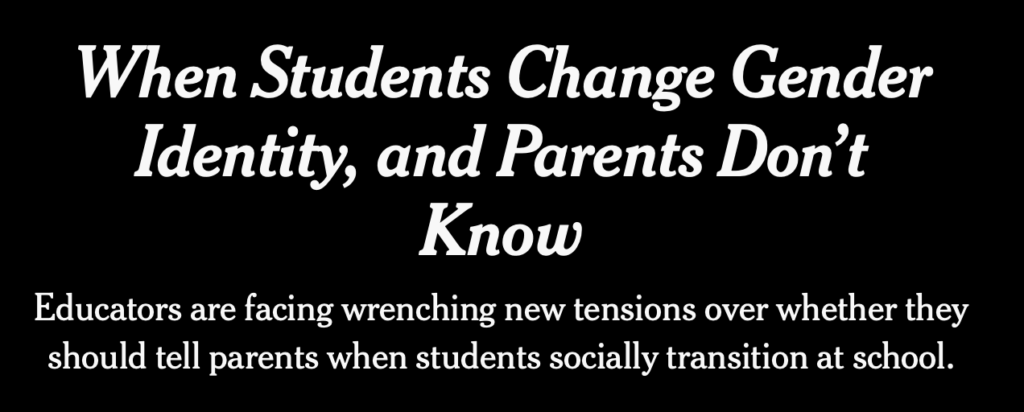Thoughtful deep dive in The Times on transgender youth and when it’s appropriate for schools to withhold information from parents. Notably, The Times seems to be breaking the taboo that this whole thing is just conservatives whipping up an issue.

I wrote about this a few months ago – short version I think it’s only OK to conceal things K-12 schools are doing with students from parents when safety is involved and then only until the situation can be stabilized. There is a lot more concern about this idea that it’s ok to cut parents out among clinicians than activists. The Times talks with Erica Anderson.
The real flashpoint is going to be some unsettled First Amendment questions about teacher rights. Those are in the courts and bear watching.
Related to that, this part of the Times article struck me,
“Educators have also said they feel bound by their own morality to affirm students’ gender identities, especially in cases where students don’t feel safe coming out at home.”
Leave aside that affirming and actively concealing your actions from parents are two different things, this is not good ground to fight this issue out on.
Advocates and some educators seem not to get that there are other educators who feel bound by a different sense of morality. Some don’t want to use a student’s preferred pronouns – even when the student’s parents request it. Some think that gay kids are somehow defective or wrong. Like the idea of “lived experience,” personal conceptions of morality are a bad way to govern actions in the public sector. They’re not falsifiable. They are arbitrary in a pluralistic society.
In the public schools – and the public sector more generally – you’re not bound by your own morality. You’re bound by the law. It’s why you can’t, for instance, decide to not issue marriage licenses to gay couples if you’re a public official. That’s the other side of this same culture war coin. On any particular issue you may not get the result you personally prefer, but it’s less capricious and preferable to unilateral action by state actors based on their own feelings. That basic idea is getting lost here.
If you’re on the side of the debate where public opinion is not yet on your side – you should be especially cautious about claiming that conceptions of morality are grounds for individual action by state actors. Yes, sometimes defying laws is part of changing them. In this instance, however, we’re talking about kids and their parents and families.
And, yes, the law here is a mess right now. What rights young people do and don’t have objectively makes little sense across the states and within particular states. But in a liberal society the law is the best we’ve got. It’s more stable and predictable than any person’s individual sense of what’s moral. Danger that way lies for public schools and more generally.
A colleague remarked recently that everyone he knows who has gone off to the culture wars comes back wounded. I’m worried that will be true for the public schools as well.
One other note on this. It’s the kind of issue where people are going to disagree in good faith. And one where I suspect society will evolve. My own view is that we’ll become much more welcoming toward kids (and adults) who express themselves in ways that don’t correspond with biological sex but much more restrained on medicalization of gender issues for kids. Other countries are already moving that way. In a decade or so people will wonder why we fought about pronouns so much but other aspects of today’s debate won’t age well at all.
At the same time, what’s startling to me is the intensity of preference falsification here. There are conservatives who are fairly libertarian about how people should live their lives and just want to ensure schools aren’t getting front of families. They should speak up more. And plenty of people on the left who don’t think schools should conceal transitions from parents feel pressured not to say so (or want to signal group solidarity). Everyone, especially these kids, would be a lot better off with a more honest conversation.
ICYMI – Bellwether released a deck last week that had a little data related to this issue and a lot on a variety of political and cultural issues affecting schools.
